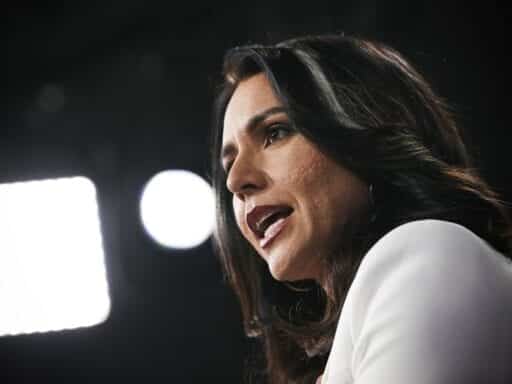Gabbard might qualify for the next debate — if the rules don’t change.
Rep. Tulsi Gabbard finally won some delegates: She came in second in the American Samoa caucuses on Super Tuesday, winning two pledged delegates.
That win doesn’t put her in contention for the nomination — she’d need 1,899 more delegates to become the nominee — but under the rules for the last Democratic debate, it would get her on the stage.
Under the new rules, however, she will not be invited to the next Democratic debate on March 15.
Xochitl Hinojosa, the Democratic National Committee’s communications director, tweeted Tuesday evening that “of course the threshold will go up.”
“By the time we have the March debate, almost 2,000 delegates will be allocated,” Hinojosa wrote. “The threshold will reflect where we are in the race, as it always has.”
Friday, the Democratic National Committee (DNC) announced what the new threshold will be, as Cameron Peters explained for Vox:
To qualify, candidates will need to have earned at least 20 percent of all delegates available from the primary so far. Right now, that means only two candidates have qualified: former Vice President Joe Biden and Sen. Bernie Sanders.
The new guidelines are a marked change from the criteria for getting into the February 25 debate in Charleston, South Carolina. Then, the DNC said candidates had to have one or more of the following: at least 12 percent support in two DNC-approved South Carolina polls, at least 10 percent support in four DNC-approved national polls, or at least one delegate from any contest that had been held so far.
As Hinojosa noted, the DNC has worked to make the rules for debate participation more stringent as the primary has gone on. When the primary started, a candidate had to have at least 1 percent support in at least three state or national polls or have raised money from at least 65,000 individual donors (spread over at least 20 states, with at least 200 donors in each of those states).
As time went on, candidates had to meet both a polling and individual contribution requirement. Eventually, both the contribution and polling level thresholds became more exacting, leading to a number of candidates then still in the race, like Sen. Cory Booker and writer Marianne Williamson, being excluded.
As the increasingly high debate bar began to exclude candidates of color, there were calls to loosen the restrictions to ensure the debates featured diverse perspectives. In December, nine candidates came together and sent a letter to the DNC saying the increasingly difficult to meet debate criteria had “unnecessarily and artificially narrowed” the race.
The DNC dismissed this criticism but did announce a major change in February — no longer were individual contributions required. The move was widely seen as being made to allow former candidate and former New York City Mayor Mike Bloomberg onto the debate stage. And it upset a number of the candidates, including Sen. Bernie Sanders, who called the decision “the definition of a rigged system.”
The DNC disregarded the criticism, and Bloomberg appeared in both the Nevada and South Carolina debates. Now, with most candidates — including Bloomberg — out of the race, the DNC has changed the debate rules again, meaning the race’s last woman candidate and last candidate of color will not appear in the next debate.
Author: Sean Collins
Read More



